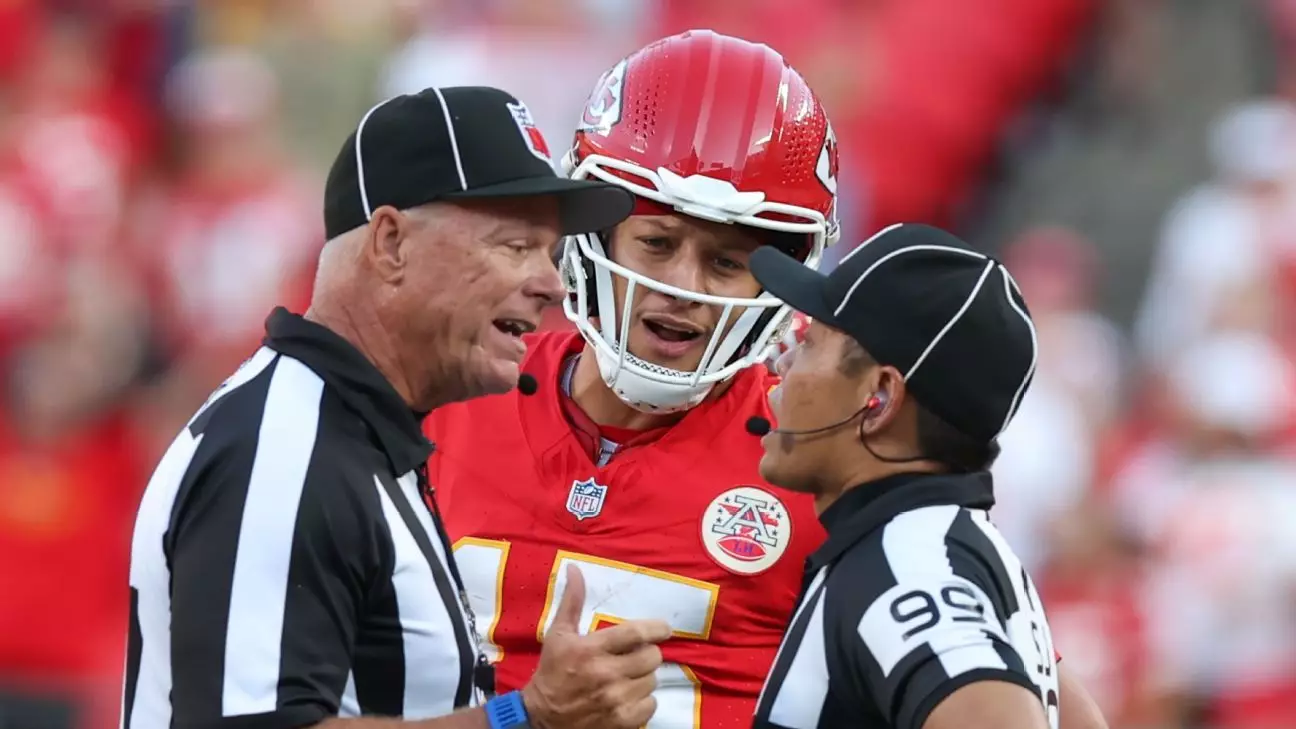The excitement surrounding NFL rivalries often brings a drama that transcends the game itself, and few matchups capture this essence like the Kansas City Chiefs versus the Buffalo Bills. With a history that has evolved into one of the league’s biggest rivalries, this matchup not only brings the allure of athletic talent but also highlights the complexities of officiating in high-stakes games. As the Kansas City Chiefs prepare to face the Buffalo Bills in the AFC Championship Game, discussions about player performance, coaching strategies, and officiating decisions loom large. This year marks the latest chapter in a five-year saga that not only tests the mettle of the players but also stirs debates around fairness and accountability in officiating.
Quarterback Patrick Mahomes, who leads the Chiefs with a tenacity matched by few, weighed in on the perception that his team receives preferential treatment from referees. Despite the frustrations voiced by opposition players, Mahomes insists, “I don’t feel that way.” His remarks reflect a commitment to sportsmanship and the acknowledgment of the difficult job that referees face. By framing his response around respect for the staff and the game’s integrity, he underscores a core value in professional sports—focusing on the task at hand rather than the external narrative.
“Every play’s different,” Mahomes argues, interpreting the game’s unpredictability as part of its charm. This acknowledgment signals not only maturity as a player but also a profound understanding of the nature of competition itself. While some may criticize the officiating during last week’s divisional round against the Houston Texans, in which controversial calls against Mahomes led to significant penalties, Mahomes remains focused on what he can control. This mindset is crucial for both him and the team as they gear up for upcoming challenges.
Conversely, the Texans’ perspective sheds light on the frustrations faced by teams pitted against what they perceive as officiating biases. Will Anderson Jr., a defensive end for the Texans, expressed disbelief over calls that emerged amidst critical moments for his team. This sentiment encapsulates the emotional rollercoaster players endure, underscoring the delicate balance between competition and fairness. The narrative of “us versus them,” particularly with referees, serves to ignite passion within a team while adding a complex layer to the rivalry.
The penalties incurred by the Texans during their match against the Chiefs portray a broader issue within the NFL—how officiating often becomes a focal point in discussions, shaping narratives that can influence future matchups. While Mahomes continues to promote understanding and adaptability to these calls, Anderson’s frustration reveals a palpable tension, showcasing the dual nature of competitive sports where interpretations of fairness can hinge on the outcome of a single play.
Diving into the exhilarating quarterback duels, Mahomes and his counterpart from Buffalo, Josh Allen, have displayed what some may call ‘the beauty of football’. Their past encounters invigorate rivalry discussions, showcasing both players’ skills and tenacity. The remarkable 2021 divisional round battle, where Mahomes and Allen each displayed their arsenals in a theatrical showdown, stands as a highlight in their burgeoning rivalry. The game, which ended in a nail-biting 42-36 overtime win for the Chiefs, is one example of why these two teams evoke such anticipation every time they meet.
When discussing his rivalry with Allen, Mahomes states, “I have to play my best football whenever I get the opportunity.” This resolve indicates the weight of performance not just on a personal level but as a team leader. In knockout scenarios such as the AFC Championship, where every listener’s breath is held, both quarterbacks must muster their finest performances to support their teammates. The motivational dynamics in these games often hinge on both strategic play-calling and individual excellence.
Adding another layer to this fierce ongoing rivalry is the issue of injuries, as demonstrated by the recent announcement of Chiefs wide receiver Mecole Hardman not being activated off injured reserve. Known for his pivotal role in last year’s playoff run, Hardman’s absence represents a significant setback for the Chiefs. Coach Andy Reid’s decision illustrates how injuries, often seen as mere footnotes in coverage, can drastically alter the chemistry and game plans of any team.
As the Chiefs rally behind Mahomes and prepare for their third clash against the Bills, one thing remains certain: playoffs are where rivalries are shaped, not just by the victories, but by the narratives built around them, including the inescapable influence of officiating, injuries, and the sheer unpredictability of the game. The anticipation for this weekend’s matchup serves not just as a contest of skill but as a testament to the complexities defining professional sports rivalries. Here, every minute, every play, and indeed, every official’s call, may have lasting repercussions.

